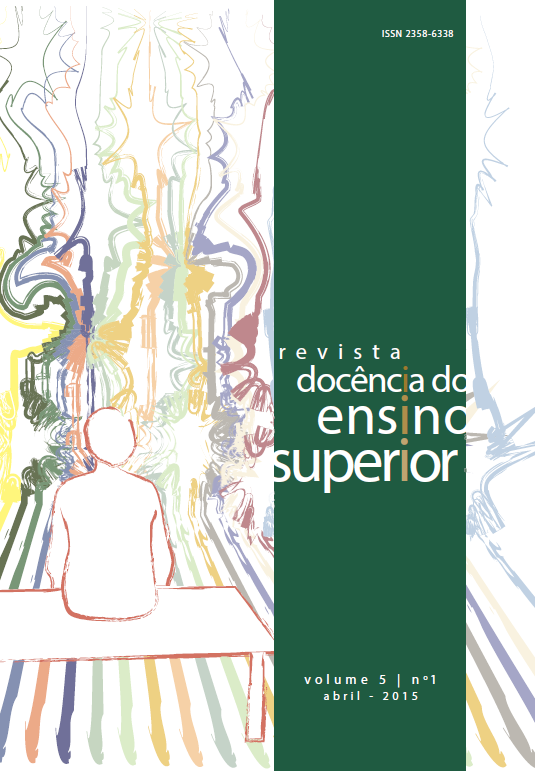Teaching knowledge and newly qualified professors
a dialogue about undergraduate professor straining
DOI:
https://doi.org/10.35699/2237-5864.2015.1970Keywords:
Undergraduate Education, Teaching knowledge, Newly Qualified ProfessorsAbstract
The thematic for undergraduate teaching has been focus of recent researches in the teaching training and practice field. Questionings about who these professors are and what they know are accompanying us in our professional practice and research. This article presents the results of a masters study that investigated the profile and knowledge involving the performance of professors appointed at the Federal University of Ouro Preto between 2008 and 2011. The methodology, with both qualitative and quantitative approaches, used, for data collection, besides the analysis of résumés, the semi-structured interview with professors hired by UFOP during the implementation of Reuni. For data analysis, it was used the method of content analysis. Considering the knowledge plurality, it was possible to identify four types of knowledge that mobilize the teaching practice of the subjects of this research: the discipline knowledge or the content knowledge; the knowledge in the relationship between professors and students; the knowledge in teaching experience and professional practice; and the knowledge acquired in the relations established within the institution. It is believed that reflecting over the teaching experience of newly qualified professors, who are beginning their careers, may help the university teaching processes, since in a general way, this is an issue that is not enough explored by researches related to professors training.
Downloads
References
ALMEIDA, P. C. A; BIAJONE, J. Saberes docentes e formação inicial de professores: implicações e desafios para as propostas de formação. São Paulo. Educação e Pesquisa, v. 33, n. 2, p. 281-295, maio/ago. 2007.
BARDIN, L. Análise de Conteúdo. Lisboa, Portugal: Edições 70, LDA, 2009.INSTITUTO NACIONAL DE ESTUDOS E PESQUISAS EDUCACIONAIS ANÍSIO TEIXEIRA – INEP. Censo da Educação Superior no Brasil. 2010.
BRASIL. Lei 9.394/1996. Estabelece as Diretrizes e Bases da Educação Nacional – LDB, 1996. Disponível em: . Acesso em: 26 maio 2012.
CHAMLIAN, H. C. Docência na Universidade: professores inovadores na USP. São Paulo. Cadernos de Pesquisa, v. 118, p. 41-64, 2003.
CUNHA, M. I. Ensino como mediação da formação do professor universitário. In: MOROSINI, C. (Org.). Professor do Ensino Superior: identidade, docência e formação. Brasília: INEP, 2000.
DINIZ-PEREIRA, J. E. A formação acadêmico-profissional compartilhando responsabilidades entre universidades e escolas. In: EGGERT, E. (Org.). Trajetórias e processos de ensinar e aprender: didática e formação de professores. Porto Alegre: EDIPUCRS, 2008.
FERENC, A. V. F; SARAIVA, A. C. L. C. Os professores universitários, sua formação pedagógica e suas necessidades formativas. In: DALBEN, A. I. L. F. (Org.). Convergências e tensões no campo da formação e do trabalho docente. Belo Horizonte: Autêntica, 2010.
FRANCO, M. L. P. B. Análise de Conteúdo. 3. ed. Brasília: Liber Livro Editora, 2008.
GAUTHIER, C. Por uma teoria da Pedagogia: pesquisas contemporâneas sobre o saber docente. Ijuí, Rio Grande do Sul: Editora Unijuí, 1998.
GAUTHIER, C. Por uma teoria da Pedagogia: pesquisas contemporâneas sobre o saber docente. 3. ed. Ijuí, Rio Grande do Sul: Editora Unijuí, 2013.
HARGREAVES, A. Os professores em tempos de mudança: o trabalho e a cultura dos professores na idade pós-moderna. Portugal: Mc Graw-Hill, 1998.
HUBERMAN, M. O Ciclo de vida profissional dos professores. In: NÓVOA, A. (Org.) Vidas de professores. 2. ed. Portugal: Porto Editora, 1992, p. 31-61.
ISAIA, S. M. A. Desafi os à docência superior: pressupostos a considerar. In: RISTOFF, D.; SEVEGNANI, P. Docência na educação superior. Brasília: Inep. Coleção Educação Superior em Debate, v. 5, 2006.
ISAIA, S. M. A; BOLZAN, D. P. V; GIORDANI, E. M. Movimentos construtivos da docência superior: delineando possíveis ciclos de vida profissional docente. In: 30ª REUNIÃO DA ASSOCIAÇÃO NACIONAL DE PÓS-GRADUAÇÃO E PESQUISA EM EDUCAÇÃO, Caxambu: ANPED, 2007.
LUDKE, M.; BOING, L. A. Caminhos da profissão e da profissionalidade docentes. In: Revista Educação e Sociedade. Campinas, 2004. v. 25, n. 89, p.1.159-1.180, set/dez. 2004.
MARIANO, A. L. S. A construção do início da docência: um olhar a partir das produções da ANPED e do ENDIPE. Dissertação (Mestrado em Educação) – Centro de Educação e Ciências Humanas, Universidade Federal de São Carlos, São Carlos, São Paulo, 2006.
TARDIF, M. Saberes docentes e formação profissional. Petrópolis: Vozes, 2008.
TARDIF, M. Saberes docentes e formação profissional. 14. ed. Petrópolis: Vozes, 2012.
TRIVIÑOS, A. N. S. Introdução à Pesquisa em Ciências Sociais: a pesquisa qualitativa em educação. São Paulo: Atlas, 1987.
ZABALZA, M. A. O ensino universitário: seu cenário e seus protagonistas. Tradução: Ernani Rosa. Porto Alegre: Artmed, 2004.
Downloads
Published
How to Cite
Issue
Section
License
Authors who publish in this journal retain the copyright and grant the journal the right of first publication, with the work simultaneously licensed under the Creative Commons Attribution License which allows the sharing of work with acknowledgment of authorship and initial publication in this journal.
Authors are authorized to take additional contracts separately, for non-exclusive distribution of the version of the work published in this journal (e.g. publish in institutional repository or as a book chapter), with acknowledgment of authorship and initial publication in this journal.
Open access policy:
Revista Docência do Ensino Superior is an Open Access journal, which means that all content is available free of charge, at no cost to the user or their institution. Users may read, download, copy, distribute, print, search, or link to the full texts of the articles, or use them for any other legal purpose, without seeking prior permission from the publisher or author, provided they respect the license to use the Creative Commons used by the journal. This definition of open access is in line with the Budapest Open Access Initiative (BOAI).
























